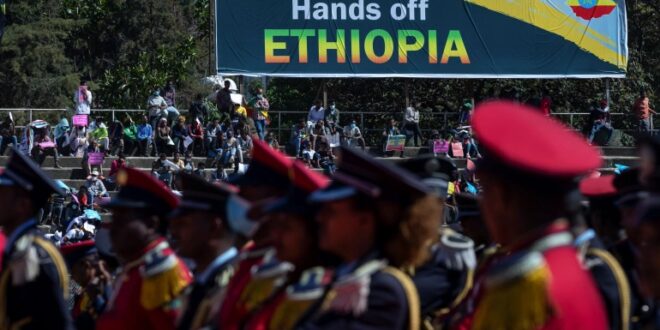Eritrea’s foreign minister accuses Biden administration of ‘stoking further conflict and destabilisation’ in Ethiopia’s north.
Eritrea’s foreign minister has blamed US administrations that supported the Tigray People’s Liberation Movement (TPLF) for the last 20 years for the current conflict in northern Ethiopia’s Tigray region, adding that blaming Eritrea for the fighting was unfounded.
In a letter to the UN Security Council circulated on Monday, Osman Saleh accused President Joe Biden’s administration of “stoking further conflict and destabilisation” through interference and intimidation in the region, apparently to “resuscitate the remnants of the TPLF regime”.
The TPLF led the coalition that ruled Ethiopia for nearly 30 years until Prime Minister Abiy Ahmed rose to power in 2018.
Abiy further alienated the TPLF by making peace with longtime foes Eritrea as soon as he took office, and tensions were rising.
Last November, Abiy sent troops into the region to detain and disarm the group’s leaders, saying it was in response to TPLF attacks on federal army camps.
Though he promised military operations would be brief, nearly seven months later, fighting continues, reports of atrocities are proliferating and world leaders are warning of a humanitarian catastrophe.
Thousands are estimated to have been killed in the war that has sent a third of the region’s six million people fleeing.
On Friday, the UN warned that famine was imminent in Tigray and Ethiopia’s north, saying there was a risk that hundreds of thousands of people would die.
Mark Lowcock, the UN humanitarian chief, said in a statement that the economy has been destroyed along with businesses, crops and farms and there are no banking or telecommunications services.
Eritrean troops
Eritrean forces were also accused of carrying out atrocities with the Ethiopian troops in Tigray.
Saleh’s letter makes no mention of Eritrean troops in Tigray, despite international calls for them to withdraw.
Eritrea acknowledged only in April that its forces were taking part in the months-long war in Tigray. Following that, Ethiopia’s foreign ministry announced Eritrean forces started withdrawing from Tigray after fighting on the government’s side.
Multiple witnesses, survivors of rape, officials and aid workers said Eritrean soldiers have been spotted far from the border, sometimes clad in faded Ethiopian army fatigues, and controlling key roads and access to some communities.
In April, Eritrean soldiers opened fire on civilians in Tigray, killing three people and wounding at least 19, according to the global rights watchdog Amnesty International.
The Ethiopian government considers TPLF fighters “terrorists” who have defied Abiy’s authority. But recent atrocities appear to have increased support for the TPLF.
Saleh accused the TPLF of conducting a disinformation campaign to camouflage its illicit schemes to arm itself and topple Abiy’s government.
He urged the UN Security Council “to take appropriate measures to redress the injustice”.
Saleh also criticised the US Department of State’s recent announcement on visa restrictions for current or former Eritrean and Ethiopian government and military officials, saying it was only the latest in a string of “unilateral acts of intimidation and interference”.
Less than two weeks ago, more than 10,000 Ethiopians also protested against the US stance on their country.
The demonstration organised in Addis Ababa by the Ethiopian authorities said Ethiopia did not need a ” Western intervention”.
 Eurasia Press & News
Eurasia Press & News



